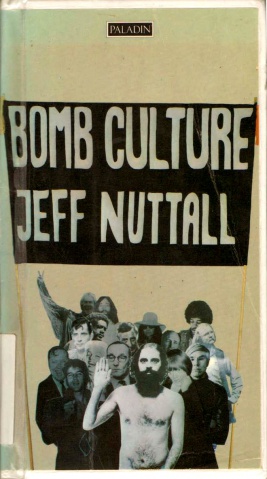Jeff Nuttall: Bomb Culture (1968/1970)
Filed under book | Tags: · activism, affect, anarchism, art, avant-garde, biography, cold war, counterculture, literature, social movements, underground, united kingdom

“Jeff Nuttall’s book, Bomb Culture, an idiosyncratic and semi-auto-biographical account of the build-up to 1968, was written in 1967 and first published just before May 1968. It remains a key primary source for the emergence of international counter-culture in the 1960s. Nuttall played a key role in the London underground scene and coordinated a network of connections with European and American avant-gardes through correspondence and the instigation of a number of small journals and pamphlets, publishing William Burroughs, Dom Sylvester Houédard, Carl Weissner and Michael McLure in his My Own Mag between 1964-67. Through a diverse body of practices, Nuttall – a performance artist and poet – advocated the insurrectionary power of spontaneity and persistently articulated a connection between the power of the imagination and collective revolutionary political consciousness.” (Gillian Whiteley, 2008)
First published by MacGibbon & Kee, 1968
Publisher Paladin, London, 1970; 1972 reprint
252 pages
via filboid
Interview with the author (John May, 1984)
Wikipedia
PDF (no OCR)
Comment (0)Thomas P. Hughes: Networks of Power: Electrification in Western Society, 1880-1930 (1983)
Filed under book | Tags: · electricity, germany, history of technology, light, networks, politics, power, technology, united kingdom, united states

“A unique comparative history of the evolution of modern electric power systems. Networks of Power not only provides an accurate representation of large-scale technological change but also demonstrates that technology itself cannot be understood or directed unless placed in a cultural context. For Thomas Hughes, both the invention of the simplest devices (like the lightbulb itself) and the execution of the grandest schemes (such as harnessing the water power of the Bavarian Alps) fit into an overarching model of technological development. His narrative is an absorbing account of the creative genius, scientific achievements, engineering capabilities, managerial skills, and entrepreneurial risks behind one of the most commonplace amenities of the modern age.” (from the back cover)
The book was awarded the Dexter Prize by the Society for the History of Technology.
Publisher The Johns Hopkins University Press, 1993
ISBN 0801846145, 9780801846144
474 pages
Review (John Neufeld, EH.net)
Review (Barry Barnes, Social Studies of Science)
Review (ZH, Innovation Group CNS UCSB)
Review (Stephen H. Cutcliffe, Technology and Culture)
Review (Mercedes Arroyo, Biblio 3W, in Spanish)
PDF (updated on 2013-9-16 to OCR’d version)
Comment (0)Nicola Anne Candlish: The Development of Resources for Electronic Music in the UK, with Particular Reference to the bids to establish a National Studio (2012)
Filed under thesis | Tags: · electroacoustic music, electronic music, music, music history, tape music, united kingdom
This thesis traces the history and development of the facilities for electronic music in the UK. It covers the early attempts to experiment with electronic music and create studios in less than ideal circumstances and the subsequent bids to create a national centre. It also covers some elements of worldwide development of electronic music and sound recording, in particular those which occurred before 1965. The thesis calls upon non-traditional sources and the author was able to access many documents in the personal archives of electronic music pioneers. There is substantial reference to committees and societies for electronic music and their effects on the development of facilities for electronic music in the UK. Some of the early pioneers are studied in detail; these include Daphne Oram, Tristram Cary and Hugh Davies. Unprecedented access to information on Hugh Davies and Daphne Oram was provided by the family estates of these recently deceased composers. This allowed the author to gain valuable insight into the working patterns and methodology of these composers. Many references to later pioneers such as Trevor Wishart are also made but the focus remains on the facilities available to composers rather than the composers and their works.
Doctoral thesis
Music Department, Faculty of Arts and Humanities, Durham University, 2012
189 pages

